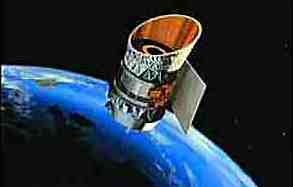 DISCOVERIES BY IRAS
DISCOVERIES BY IRAS 
 DISCOVERIES BY IRAS
DISCOVERIES BY IRAS 

IRAS - THE INFRARED ASTRONOMICAL SATELLITE
![]()
IRAS was launched on January 25, 1983. During its ten months of operation, IRAS scanned more than 96 percent of the sky four times at four infrared bands centered at 12, 25, 60 and 100 microns, increasing the number of cataloged astronomical sources by almost 70%. The IRAS mission has had a major impact on almost every area of astronomy.
 Detected about 500,000 infrared sources,
doubling the number of cataloged astronomical sources.
Detected about 500,000 infrared sources,
doubling the number of cataloged astronomical sources.
 Discovered 6 new comets
Discovered 6 new comets
 Found that comets are dustier than
previously thought and that
dust from comets fills the Solar System
Found that comets are dustier than
previously thought and that
dust from comets fills the Solar System
 Detected useful infrared data for 2004 asteroids
Detected useful infrared data for 2004 asteroids
 Detected the zodiacal dust bands - bands of infrared emission that girdle our
solar system which are likely to be debris from asteroid collisions
Detected the zodiacal dust bands - bands of infrared emission that girdle our
solar system which are likely to be debris from asteroid collisions
 Found evidence of zodiacal dust bands around other stars
Found evidence of zodiacal dust bands around other stars
 Discovered a disk of dust grains around the star Vega
Discovered a disk of dust grains around the star Vega
 Detected disks of material around several other stars.
Detected disks of material around several other stars.
 Detected several probable protostars embedded in clouds of gas and dust
Detected several probable protostars embedded in clouds of gas and dust
 Found that some Bok globules contain protostars
Found that some Bok globules contain protostars
 Cataloged thousands of hot, dense cores within clouds of gas and dust
which could be newly forming stars
Cataloged thousands of hot, dense cores within clouds of gas and dust
which could be newly forming stars
 Cataloged over 12,000 variable stars, the largest collection known to
date
Cataloged over 12,000 variable stars, the largest collection known to
date
 Revealed for the first time the core of our galaxy
Revealed for the first time the core of our galaxy
 Found infrared cirrus (wisps of warm dust) in almost every direction of space
Found infrared cirrus (wisps of warm dust) in almost every direction of space
 Data from IRAS was used to show that our galaxy is a barred spiral galaxy -
a galaxy which has an elongated central bar-like bulge from which its spiral
arms unwind.
Data from IRAS was used to show that our galaxy is a barred spiral galaxy -
a galaxy which has an elongated central bar-like bulge from which its spiral
arms unwind.
 Detected ~75,000 starburst galaxies - galaxies which are
extremely bright in the infrared due to intense star formation.
It was found that many of these starburst galaxies have "superwinds"
emerging from their centers due to the large number of supernova
explosions which occur in these galaxies.
Detected ~75,000 starburst galaxies - galaxies which are
extremely bright in the infrared due to intense star formation.
It was found that many of these starburst galaxies have "superwinds"
emerging from their centers due to the large number of supernova
explosions which occur in these galaxies.
 Detected strong infrared emission from interacting galaxies
Detected strong infrared emission from interacting galaxies
 First identified IRAS F10214+4724 - at the time,the most luminous object known in the
Universe by a factor of 2. This object may be the best candidate for a forming
spiral galaxy yet discovered.
First identified IRAS F10214+4724 - at the time,the most luminous object known in the
Universe by a factor of 2. This object may be the best candidate for a forming
spiral galaxy yet discovered.
HOME |
|
INDEX |